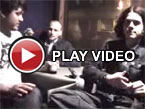KTL
 This blacker than black collaboration between Stephen O’Malley and Peter Rehberg is a great piece of mood music. KTL is more subdued than the main output from both of these artists, yet together they instil a palpable sense of tension into the music to give it a captivatingly creepy result.
This blacker than black collaboration between Stephen O’Malley and Peter Rehberg is a great piece of mood music. KTL is more subdued than the main output from both of these artists, yet together they instil a palpable sense of tension into the music to give it a captivatingly creepy result.
Editions Mego
O’Malley and Rehberg paired up to form KTL in order to soundtrack a theatrical work by Gisèle Vienne and Dennis Cooper. The work is called Kindertotenlieder (Songs on the Death of Children), after Gustav Mahler’s musical adaptations of Friedrich Rückert’s poetry. Judging from pictures on the web, Vienne and Cooper’s work is heavily influenced by the Knecht Ruprecht and Krampus traditions of Germanic Europe, as well as using strange dummies of young girls dressed in black metal shirts and hoodies. The music here is not the actual soundtrack for the theatrical work but it is related to the soundtrack according to the sleeve notes. Along with the notes in the booklet come images of anonymous long haired figures and robed beings ascending a staircase, perhaps a nod to the classic cinematic tension in a horror film before the inevitable terror.
The disc's mood is set with the 25-minute long opener, "Estranged," where the feeling of impending doom seeps like blood through a mattress. It is a musical purgatory acting as a prelude into the depths of hell. Hell in this case appears to be a forest as the next four tracks, "Forestfloor 1-4," are inhospitable and startling. Rehberg's contribution becomes more pronounced as shards of noise and sound rip through the mix like glass from a cannon. For the first two parts, O’Malley goes for fast tremolo picking instead of his usual play a chord and holding it for a couple of days approach. The end result is a cold blast reminiscent of some of the winds knifing through the northern hemisphere the last few weeks. The third and fourth parts of "Forestfloor" see O'Malley return to the slow dirge that he is famous for, at the same time Rehberg's equipment sounds like it is on its last legs.
The album finishes with "Snow," which, despite its pretty name, continues the dread that has permeated KTL from the very beginning. The uneasy quietness is deeply unsettling following the chaos of "Forestfloor," only reverb-drenched ambience and a distant high pitched squeal break the silence. It sounds like the unnatural stillness of the aftermath of something violent and bloody. It closes off the album perfectly; there is no real sense of closure per se but instead a feeling of a lucky escape. Next time whatever creature is stalking through the forest might just win.
samples:



